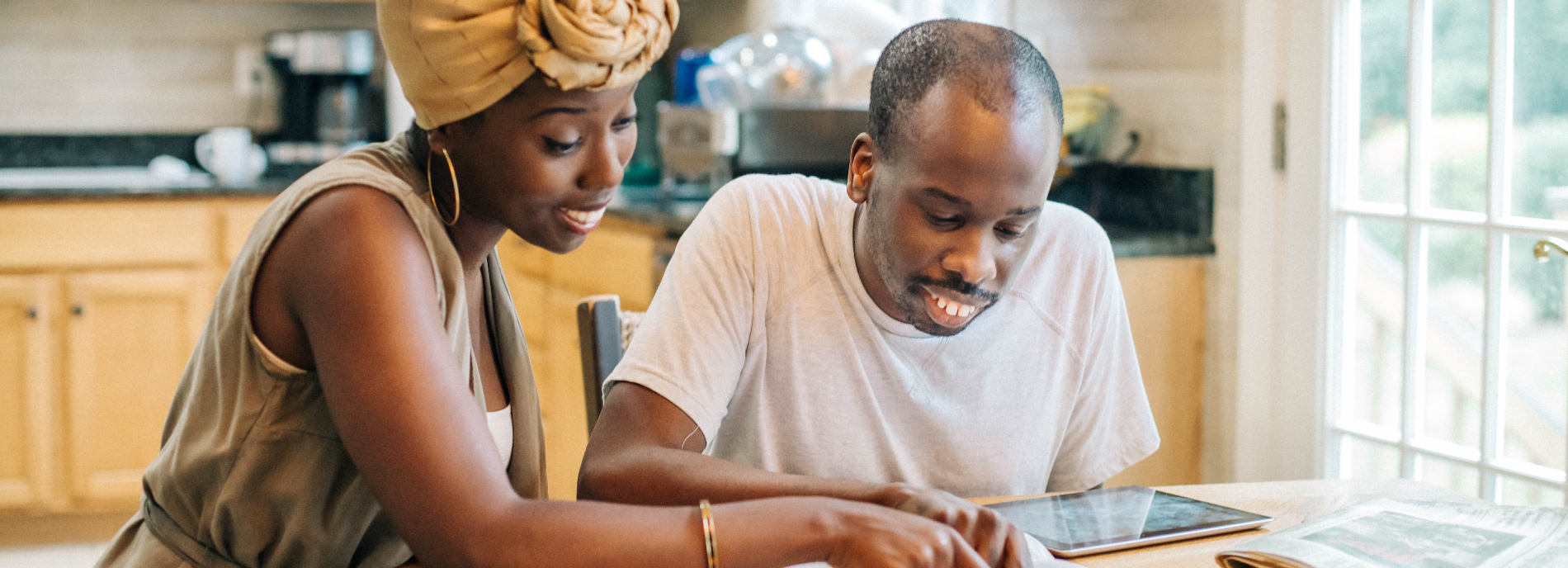
How autism shapes sibling relationships
Having an autistic brother or sister can pose challenges, but it can also make children patient, empathetic and resilient.
I
n late March, Michelle Byamugisha reached out to a local celebrity in an email with the subject line “A Message for Your Biggest Fan, My Autistic Brother.” It was two weeks into the coronavirus-related lockdown, and her 34-year-old brother, who has significant speech challenges and likes to be called Mark B, was distraught. Deprived of his cooking class, bowling and other favorite activities, he was feeling so low he could barely get out of bed.As the family discussed what to do, Byamugisha had an idea. Her brother is fascinated by weather and has for years tuned in every evening to broadcasts from meteorologist Steve Rudin of WJLA in Washington, D.C. What if Mark B heard from Rudin directly? That might jolt him out of the doldrums, Byamugisha reasoned.
In her email, Byamugisha explained Mark B’s distress, noting that the loss of routine “is especially difficult for someone on the autism spectrum.” Then she made a request: “If you have a moment,” she wrote, “it would be incredible if you could record a video message for my brother. It would lift his spirits exponentially.” She was not counting on a response but thought it was worth a shot if it could help her brother.
Siblings such as Byamugisha often play an important support role in an autistic person’s life, but they are in some ways the forgotten family members in autism research. Though the younger brothers and sisters of children with autism attract expert attention because of their higher chances of having the condition, studies about the experience of having an autistic sibling are sparse. And until about 20 years ago, the few that existed started from the premise that a child with autism was a problem for the other children in the home.
Over the past decade or so, however, researchers have begun exploring siblings’ actual experiences, and they are learning that autism flavors these relationships in myriad ways. “It’s not that disability is this outside force. Disability is actually part of the relationship,” says Ariella Meltzer, a research fellow at the Centre for Social Impact at the University of New South Wales in Australia. “It’s part of the essence, part of what’s communicated and felt between siblings.”
The relationship can have upsides for both the typical and autistic siblings. A typical child may develop qualities such as maturity, patience, resilience and empathy. And for a child with autism who finds socializing challenging, the banter and bickering of siblinghood may provide a meaningful experience of friendship.
Although having an autistic sibling can be difficult at times, many typical children feel protective of their autistic brother or sister and invested in their sibling’s success. They may act as translators if their sibling’s speech sounds garbled to strangers, and they may understand their brother or sister’s needs and abilities even better than their parents do. “For many siblings, diversity training begins before breakfast, 365 days a year, and starts at a very, very young age,” says Emily Holl, director of the Sibling Support Project, a nonprofit organization based in Bellevue, Washington.
Bolstering the bond between siblings when one has autism has practical benefits for families. As parents age and become unable to care for their adult children with autism, siblings often become the principal caregivers. And they are more likely to take on these duties willingly, research suggests, when there is a history of shared closeness.
Michelle Byamugisha, 27, who works in public relations and lives in Washington, D.C., and her other brother Jeremy have kept Mark B’s needs central as they have gone about building their adult lives. Jeremy Byamugisha, 32, who is an accountant, still lives with Mark B and their parents in Gaithersburg, Maryland, and helps with Mark B’s care. “It has made me patient,” Jeremy says. “Mark has had a big influence on that.” For her part, Michelle is careful not to bring home friends until she knows they are keepers, because Mark B will ask about them (and remember their birthdays) forever. “It just kind of creates this shared commitment between me and Jeremy, to just only want to bring nothing but peace and stability to the family,” she says.
In return, Mark B cherishes them. “It’s one of the first things he says when he meets people. He’s like, ‘I’m Mark B, I have a sister, I have a brother.’ He gives them the whole rundown about my life and Jeremy’s life,” Michelle says. “To have a brother that is so happy to see me and so excited by every development in my life, it’s like having a cheerleader through thick and thin.”
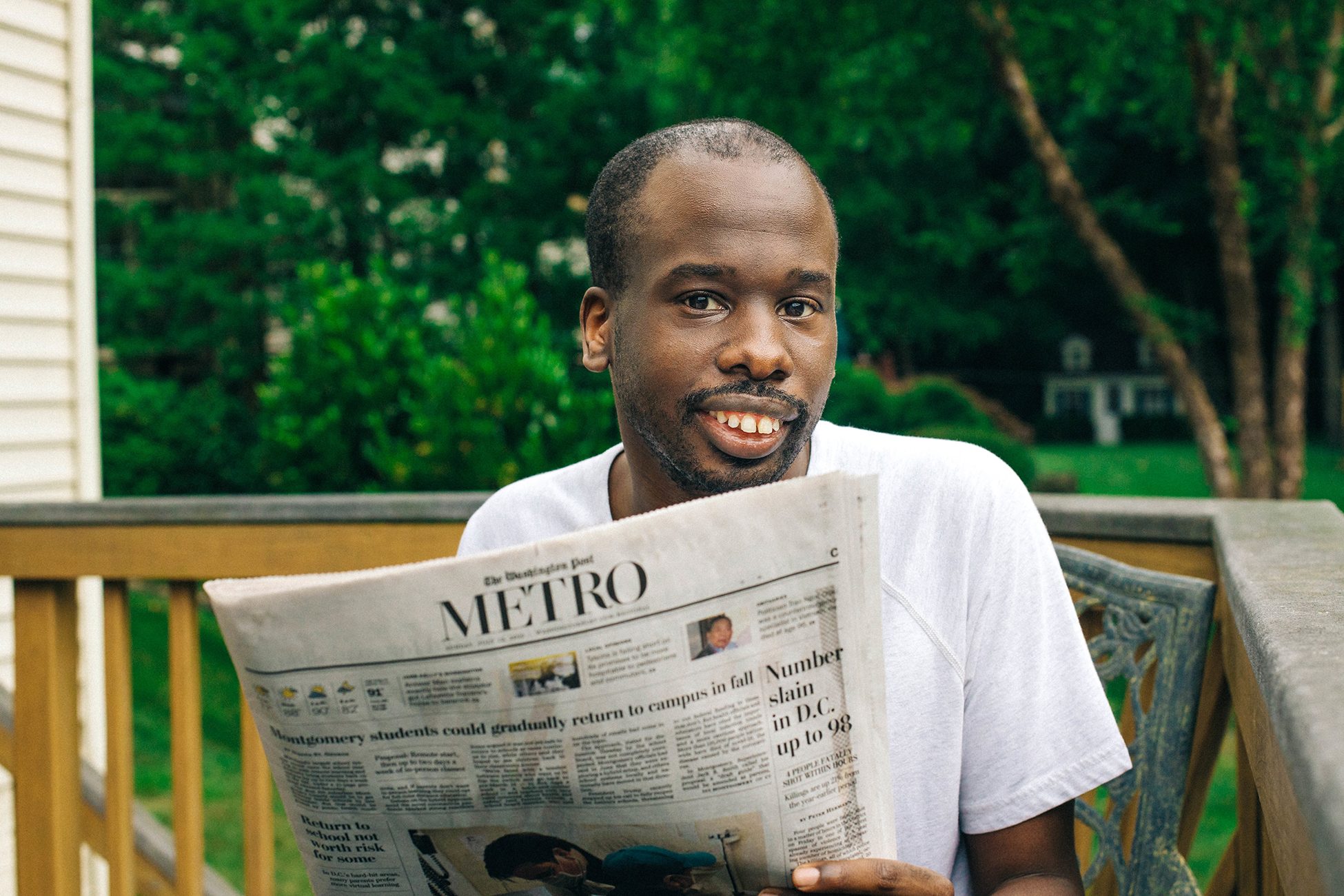
Sunny forecast: Mark Byamugisha, who is autistic, checks the local weather.
One hug only:
T
he sibling relationship is among the longest and most formative of a person’s life. Children learn with their siblings how to play, argue, share and negotiate. Research suggests that close sibling relationships are associated with better mental health later in life.The nature of autism can make closeness difficult, however. People with autism often have difficulty identifying and expressing their emotions, as well as understanding what others are feeling. They may be uncomfortable with affection: “One hug only,” Mark B often politely reminds people. Many studies suggest that sibling relationships tend to be less close when a brother or sister has autism than when a sibling has another developmental condition, such as Down syndrome, that does not affect the ability to connect. “Social interaction requires two people, right? It’s kind of like a dance,” says psychologist Theodore Tomeny of the University of Alabama. When a sibling has autism, the dancers may be out of sync.
Typical children with autistic siblings are more prone to anxiety and depression, on average, than their peers, according to a 2019 analysis of 69 studies. They also tend to have more difficulty establishing positive relationships with others and to possess more negative beliefs, which can take the form of low self-esteem, a poor view of disability or a general lack of optimism, according to lead investigator Carolyn Shivers, a psychology researcher at the Virginia Tech Center for Autism Research.
The sibling relationship may be particularly strained if an autistic child takes out her anger and frustration on her brothers or sisters by hitting, punching or yelling at them. In a long-term study published in 2007, psychologist Richard Hastings, now at the University of Warwick in the United Kingdom, interviewed the mothers of 75 sibling pairs in which one child has a developmental disability. When the disabled child had a high level of behavior problems at the start of the study, the typical sibling was likely to be withdrawn, angry or restless two years later. “If you’re growing up in a situation that presents some unique challenges and maybe threats to personal safety and, in some cases, real trauma, you can feel very alone,” Holl says.
Living in poverty and having parents who are stressed or depressed can also put siblings at risk for mental health issues. Raising a child with a disability, who may need special classes and constant supervision, requires time and money that many families can ill afford, and these unmet needs can put extra pressures on siblings.
Still, research suggests that most people with autistic siblings are psychologically healthy, and just as well adjusted as their peers. “A lot of kids do just fine. They do really well, in fact. They’re no different from a sibling in any other type of relationship,” Tomeny says.
Because they grow up familiar with disability and as peers to their autistic brother or sister, nonautistic siblings have a unique perspective compared with parents, Meltzer says. For Brett Aurin, 15, of Foothill Ranch, California, whose twin brother Kyle has autism, that perspective leads to acceptance. “Sometimes things can be a little bit more difficult, but he’s not a separate species,” Brett says. “I just see it as his personality. He’s just my brother. I forget even that he has autism.”
Compared with other children and teenagers, those with an autistic brother or sister may be more mature and more adept at a form of empathy called perspective-taking, which means they can consider another person’s point of view. Having a sibling with autism can also nurture gratitude. Abigail Diaz, 29, says her brother Daniel, 20, calls her up to 100 times a day to say “I miss you” or to chat, a frustrating number of interruptions for someone with a full-time job. “It’s tough,” says Diaz, who is director of education and public programs at the Wisconsin Maritime Museum, “but I remember a time that he couldn’t talk. So I will take this over not being able to talk to him, any day.”
In a 2019 study titled, in part, “I don’t live with autism; I live with my sister,” researchers interviewed nine girls aged 10 to 14 whose autistic siblings do not speak. Many of the girls were exhausted and worried about the future. Yet they appreciated their siblings’ sensory differences (two girls called them “superpowers”), knew how to stave off meltdowns, and expressed feelings of acceptance, love and hope.
Many siblings express this kind of appreciation for their autistic brother or sister, according to a meta-analysis published earlier this year. “There was an overarching narrative of love, empathy and compassion,” says lead researcher Alexandra Leedham, a clinical psychologist at the Chesterfield Royal Hospital in the U.K. “Some people certainly felt that it made them a stronger person.”
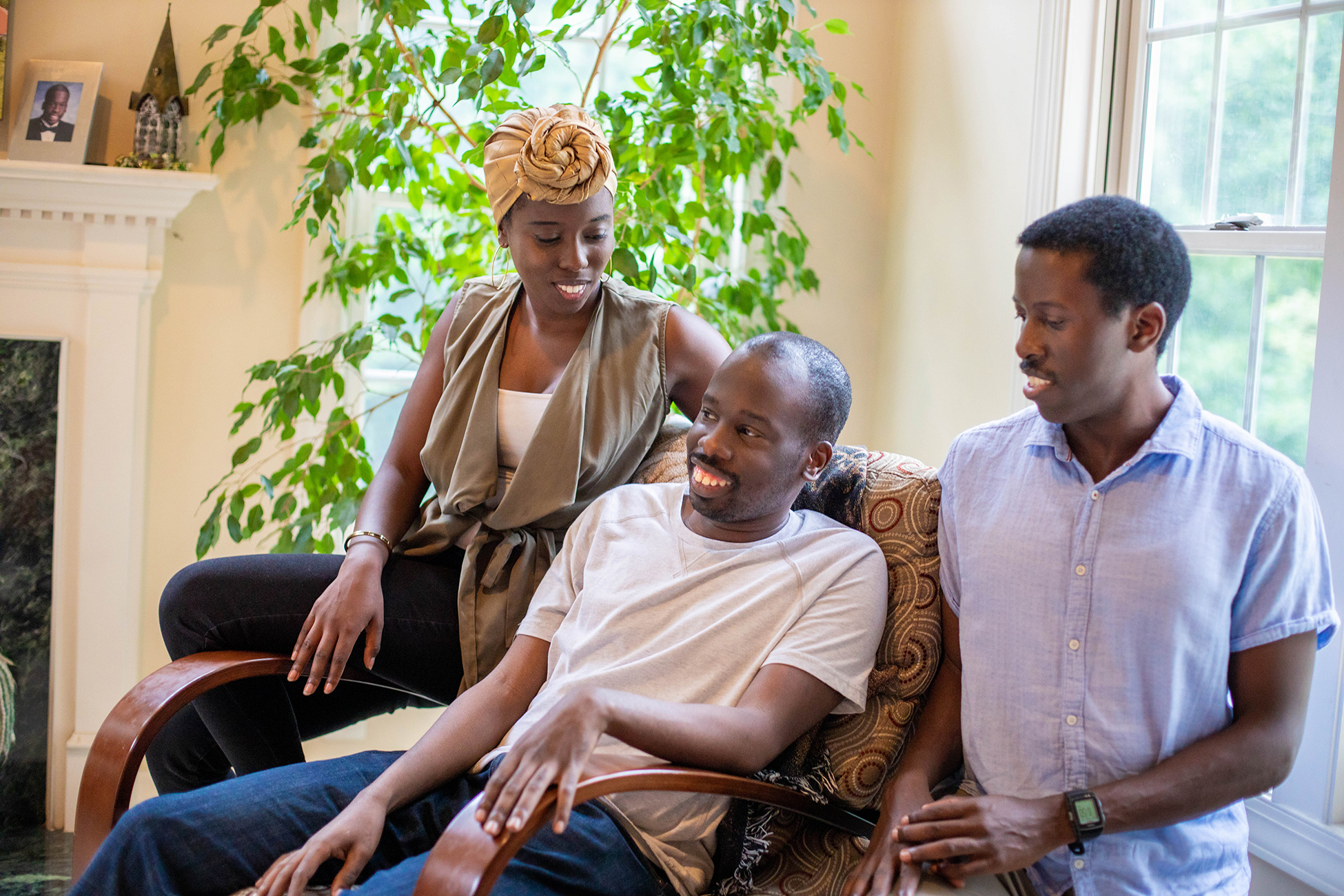
Three’s company: Michelle Byamugisha (left) and her brother Jeremy (right) play integral parts in the life of their brother Mark B (center).
Stop being the dad:
S
ome autistic children require so much attention that their siblings get lost in the shuffle. “Their needs may be overlooked, or have to come a bit second,” Leedham says. In a study published earlier this year, for example, one girl complained that her parents downplayed her learning issues because they were minor compared with her brother’s challenges. As a result, she was not diagnosed with dyslexia until she was 12.The siblings of children with autism fare better when they have people in their lives — parents, extended family, coaches, teachers or friends — who listen to and appreciate them and whom they know they can rely on for help. Tomeny and his colleagues have found that children with autistic siblings who want and receive support have relatively few emotional and behavioral problems. By contrast, the children who say they do not get the support they need have more problems — for instance, angry outbursts or feeling afraid or worried.
One thing adults can do to support typical children is to help them understand that an autistic sibling’s difficult behaviors are a function of brain wiring. “Around when I was 6 years old, my mom explained everything about autism,” says Luciana Heresi, an 11-year-old in Orange County, California, whose 13-year-old brother Santi has autism. Her mother showed her videos that explained that some people with autism talk repeatedly about special interests. “When I was younger, I was like, ‘He already told me this, he already told me that.’ I thought he was doing it on purpose just to annoy me,” Luciana says. “But now that I know, I’m like, ‘Oh, okay, I understand.’ Like, I can deal with it because I know he has autism.”
Siblings should be allowed to calibrate the relationship, experts say, and not, for instance, be required to act as impromptu tutors, babysitters or rule enforcers. Brett Aurin says that he does keep an eye on his twin brother at times, but his parents try not to lean on him too much for help. They sometimes even tease that he “needs to stop being the dad,” he says.
When siblings take on responsibility for a brother or sister by choice, experts say, they are far less likely to feel resentful than if they are forced to do it. By the time she was in high school, Diaz was keeping track of her brother Daniel’s prescriptions and bringing him to doctors’ appointments, not hanging out at the mall. “I didn’t do the things that typically a kid would do, but I don’t feel I missed out on anything, because I was there for all the milestones with Daniel,” Diaz says. “Something about our bond has been magical. My name was his first word. His first steps were to me.”
Specialized support programs can also help siblings with their own moods and behavior. The Sibling Support Project, for example, runs groups called Sibshops in communities around the United States and abroad for children aged 8 to 13 who have a disabled sibling. “It’s an outlet, a place where they can go to talk about their experience, thoughts and feelings,” Holl says. “You can feel very alone if you don’t know other people who are going through similar situations.”
The experience of having a sibling with autism is complex. A child may resent that her brother’s behaviors make family vacations impossible, but also feel pride when he learns to tie his shoelaces at age 13. “The sibling experience is really a mixed bag,” Holl says. “It’s not all great or all terrible. It’s kind of all of the above at any given time.” Experts emphasize that no one should feel guilty for not having a good relationship with their autistic brother or sister. “Some of [the stories] are great, and some of them are not. All of them are equally valid,” Shivers says.
Whether the relationship is close or problematic, children tend to ‘get’ their autistic sibling’s sensitivities and strengths. In the 2019 survey of sisters, one young girl groused that her parents continued to try to make her autistic brother eat foods he did not like, even though it predictably ended in a tantrum. And Holl recalls a Sunday morning workshop full of sleepy teenagers that came alive around the issue of unequal expectations. Many griped good-naturedly that their parents underestimated their siblings’ abilities. “I know he can empty the dishwasher,” one boy said of his brother, “because when our parents aren’t home, I get him to do it. He actually likes it!”
In the past few years, experts have begun to look at these relationships from the other side too, soliciting the voices of autistic siblings. This new research is revealing that people with autism often see nothing unusual about their sibling relationships. Whatever issues the typical sibling may encounter are not always evident to the sibling with autism. “Siblings with and without disabilities don’t always agree on what’s happening in their relationship,” says Meltzer, who has led much of this work. “And we didn’t really know that until we actually started talking to both of them.”
That disconnect occurred for brothers AJ and Jarrett Link. Their parents divorced when they were young, and AJ, who was diagnosed with autism as an adult, helped raise Jarrett, who is four years younger. Jarrett recalls awkwardness and silences that confused him when he was a child. After AJ, who is now 30, was diagnosed, everything made more sense. “It explained a lot of things,” says Jarrett, who now feels comfortable with his brother’s need for alone time.
For his part, AJ was unaware that the awkwardness existed. “It’s weird to think about how for me, it was just normal experience,” he says. “But for [Jarrett], it was kind of a different experience where he didn’t quite understand what was going on.” The brothers appreciate each other’s strengths. AJ admires Jarrett’s emotional supportiveness, and Jarrett says AJ, who graduated from law school this year, is the smartest person he knows: “If I could just try and do some of the things he does on an intellectual level, I’d be very well off.”
A similar loyalty inspired Michelle Byamugisha to contact Rudin, the TV weatherman, on behalf of her brother during the pandemic. And less than an hour after she pressed send, a custom-made video arrived. “Hey Mark B, it’s Steve. I am so happy to know that you’ve been watching me for over a decade,” it began. “I know things are a little bit different right now because so much is changing in our world, but we’re all going to get through this together.” After more reassuring words, Rudin concluded with an invitation: “I hope that one day when things get better, you and your sister can come visit me here at the station. I’d love that.”
As Mark B watched Rudin’s message on his mother’s smartphone, his brother Jeremy filmed his quietly delighted reaction. Michelle posted that video on Twitter, where it has been viewed more than 64,000 times.
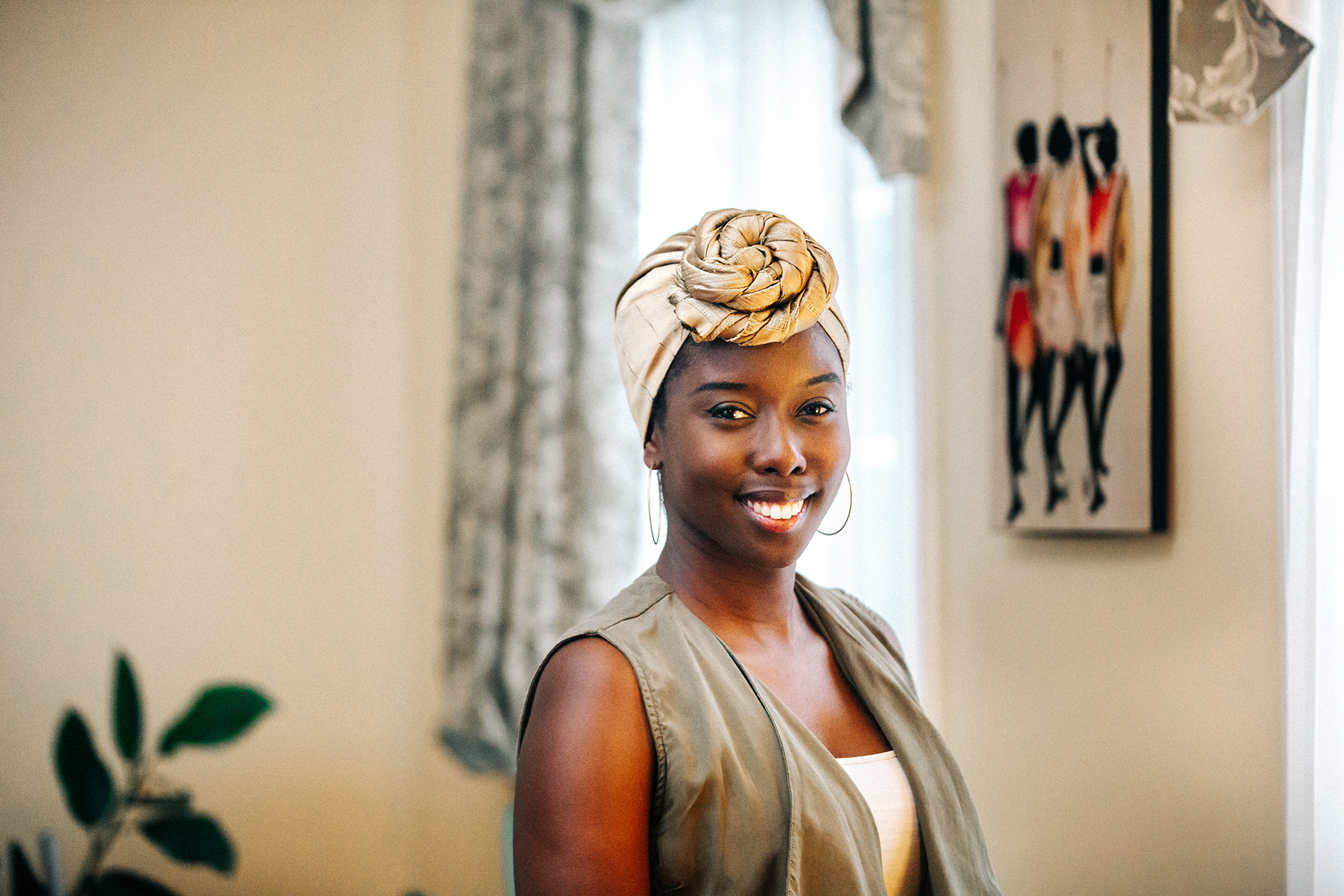
Sibling support: Michelle Byamugisha says her autistic brother Mark B is her “cheerleader through thick and thin."
Recommended reading
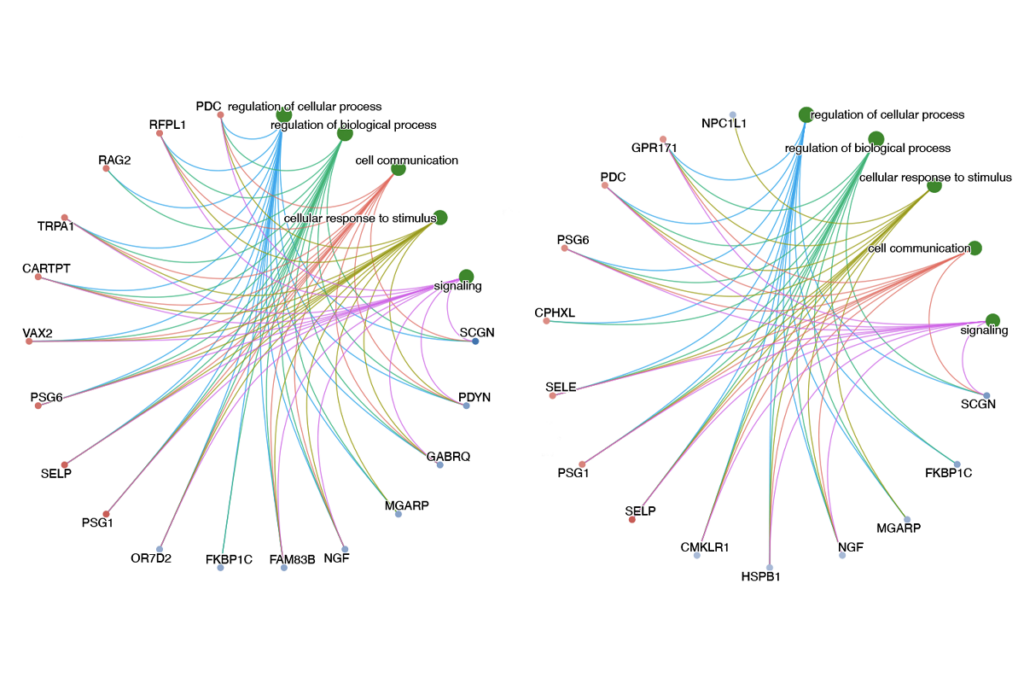
New tool may help untangle downstream effects of autism-linked genes
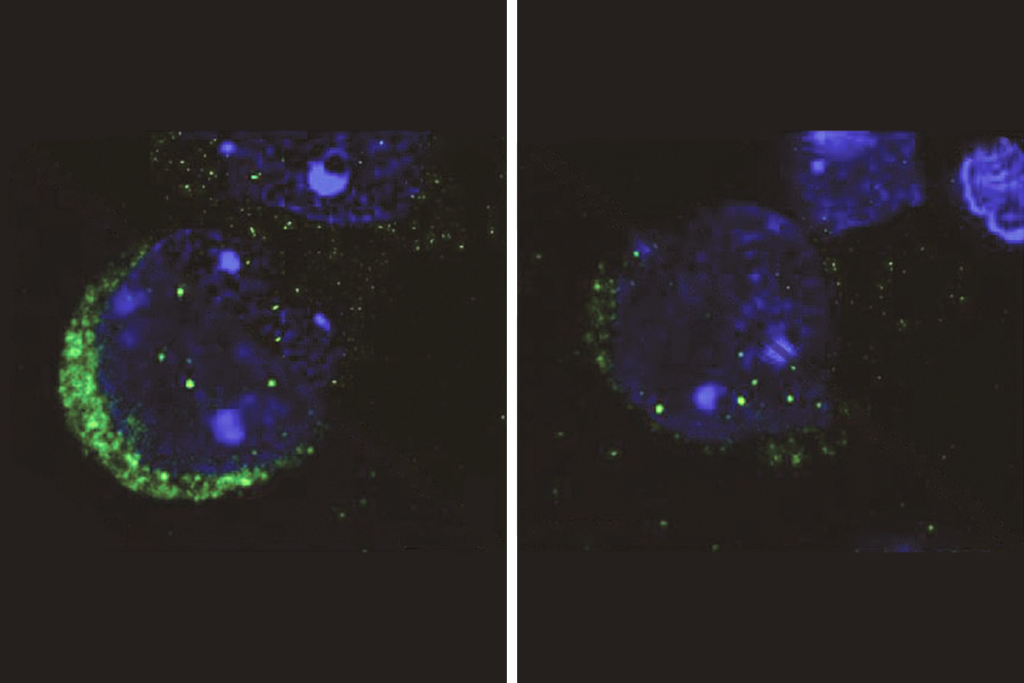
NIH neurodevelopmental assessment system now available as iPad app
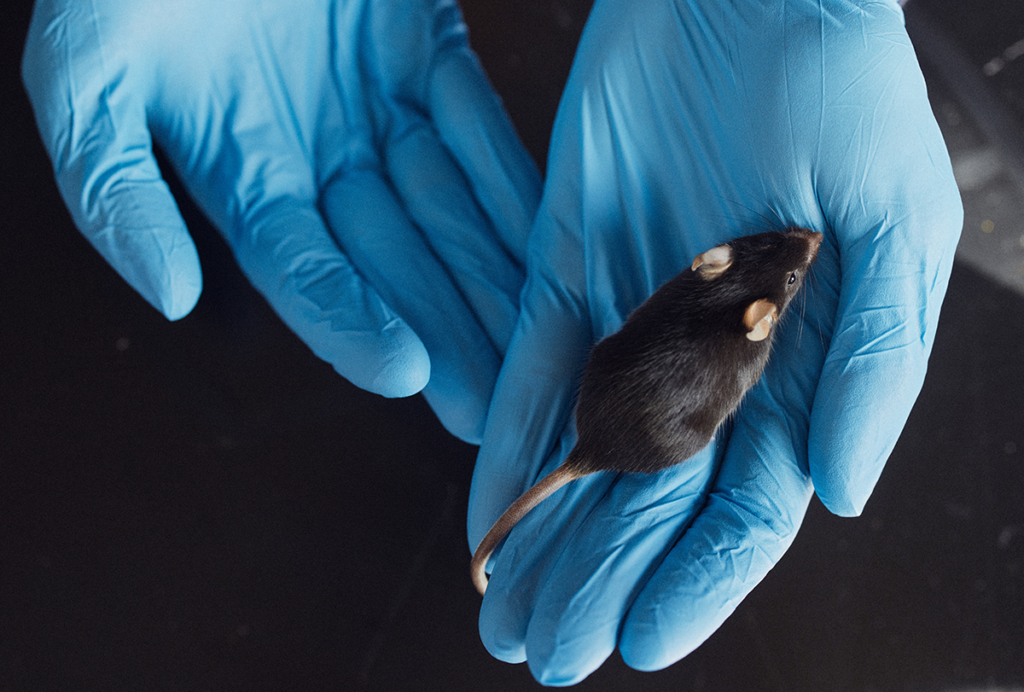
Molecular changes after MECP2 loss may drive Rett syndrome traits
Explore more from The Transmitter

Organoids and assembloids offer a new window into human brain
Who funds your basic neuroscience research? Help The Transmitter compile a list of funding sources
